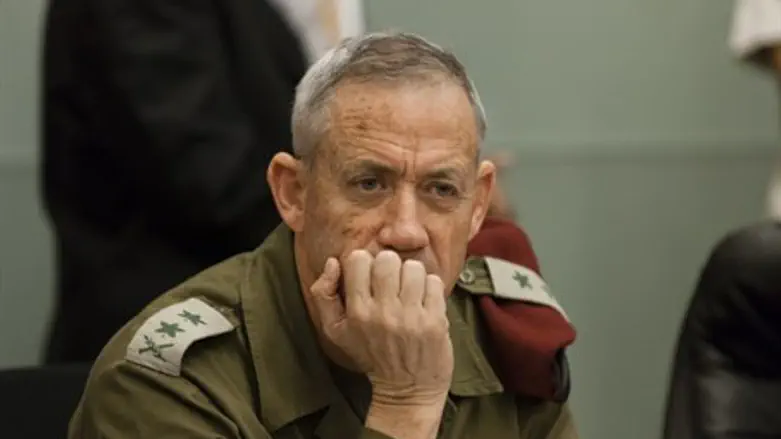
IDF Chief of Staff Benny Gantz was unusually candid on Wednesday, declaring during a presentation to a high school in Gan Yavne that the IDF is fighting Israel's enemies on all fronts.
"The Israeli Navy will be wherever we want them to be," Gantz noted in the speech, which was quoted by Channel 10. "I have not even mentioned the dozens of classified activities the IDF carries out [to defend Israel], some of which happened over the last week and are happening as we speak."
Gantz also discussed possible plans for the future of the IDF, and made clear that an armed conflict with Iran is not an impossibility. "We can talk about shorter and longer ranges" Gantz said, "like Iran [. . .] which is not out of the IDF's range." The Chief of Staff's admission as such surfaces on the same day that one report claimed the IDF is actively preparing for a conflict with Iran in 2014.
The students asked the Chief of Staff whether it is possible to stop the rocket fire at Gan Yavne and other southern communities, following the barrage of rockets which hit Israel in the last week.
Gantz responded, "If we want to make sure that nothing will come from there, we need to retake Gaza [...] it's a problem we deal with every week."
"The decision to 'sleep on it' is a strategic move," he added.
Gantz's comments echo the sentiments of Foreign Minister Avigdor Liberman, who reiterated last week that Israel must retake Gaza to prevent more rocket fire from the Hamas-controlled territory.
"Following an attack like this - a barrage of more than 50 rockets - there is no alternative to a full reoccupation of the entire Gaza Strip," he said.
Intelligence Minister Yuval Steinitz agreed.
“Sooner or later we will have to take control of Gaza, in order to get rid of the Hamas regime,” Steinitz said. “We do not need to reoccupy it permanently, but we do need to remove from Gaza the option of firing rockets on us. If and when the moment comes when we must retake Gaza – and that moment is coming soon – the operation will have to be a very quick one,” said Steinitz.
An operation like this is likely to be distasteful to Israelis, but there really is no choice, said Steinitz. “This really should have been done in 2012, in Operation Pillar of Defense, when they fired rockets at Tel Aviv and Jerusalem. The IDF entered Gaza and managed to halt the firing of rockets for a time, but I was of the opinion that we should have continued.”
Israel withdrew from Gaza in the 2005 "Disengagement Plan", which saw the withdrawal of all IDF positions and the destruction of all Jewish communities in the territory, along with the forced expulsion of the roughly 9,000 Jews living there.
At the time, right-wing leaders had warned the withdrawal would worsen, rather than improve Israel's security situation, and that troops would simply have to return to curb rocket-fire against nearby Israeli communities - a stance largely vindicated by the subsequent spike in rocket attacks following the seizure of the territory by Hamas, which prompted two separate counterterrorism operations.